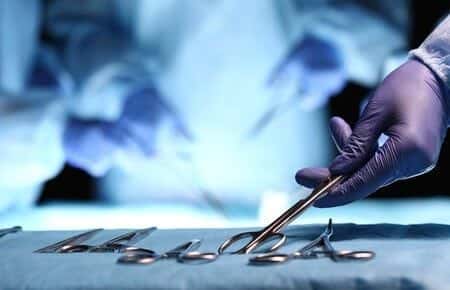Gynecologist Causes Bowel Perforation During Laparoscopic Surgery
Updated on
This case involved a forty-two-year-old female patient who presented to a local hospital for surgery due to complaints of abdominal pain. The patient underwent a diagnostic laparoscopy, bilateral salpingo-oophorectomy, and lysis of abdominal adhesions. The postoperative note indicated that the procedure was conducted properly without complications and the patient was discharged on the same day of surgery. Several days later, the patient was readmitted to the hospital for abdominal pain and swelling, which required diagnostic testing. Further examination revealed that her sigmoid colon had been perforated. This finding required further surgical correction and a placement of a colostomy. After undergoing numerous interventions, the patient still had significant symptoms including abdominal pain, bloating, and digestive problems.
Question(s) For Expert Witness
Is injury to the bowel a common complication of laparoscopic surgery, and what steps could have been taken to reduce the risk of serious harm to this patient?
Expert Witness Response E-006830
 Injuries to the bowel are common during open gynecological surgery, however, less common when done laparoscopically. Any delay in diagnosing a bowel perforation can lead to serious fecal peritonitis and even death. If a patient is experiencing pain, tachycardia, and fever following surgery, bowel injury should be suspected, warranting immediate consultation with a general surgeon. The diagnosis can be established postoperatively as free intra-abdominal air on radiograph. If this is found, a laparotomy is indicated at this time. Injury to the bowel may result from insertion of the pneumoperitoneum needle, placement of the laparoscopic trocar, electrosurgical injury, or trauma during dissection. Symptoms from penetrating trauma generally manifest within twelve to thirty-six hours, but may occur up to five or seven days later. Presumably, patients who present after several days have experienced either delayed necrosis of damaged bowel, or had a leak which temporarily sealed off. Selective observation of patients with abdominal injury consists of serial abdominal examination, repeat laboratory studies and repeat abdonimal imaging (usually CT scan), as needed. The most important management is the use of frequent serial abdominal examinations, ideally conducted hourly. Clinical signs during the period of observation that suggest the presence of a bowel injury include progressively worsening abdominal pain, hemodynamic instability, or intolerance of oral intake. Monitoring the white cell count may contribute to the clinical picture if significantly or persistently elevated.
Injuries to the bowel are common during open gynecological surgery, however, less common when done laparoscopically. Any delay in diagnosing a bowel perforation can lead to serious fecal peritonitis and even death. If a patient is experiencing pain, tachycardia, and fever following surgery, bowel injury should be suspected, warranting immediate consultation with a general surgeon. The diagnosis can be established postoperatively as free intra-abdominal air on radiograph. If this is found, a laparotomy is indicated at this time. Injury to the bowel may result from insertion of the pneumoperitoneum needle, placement of the laparoscopic trocar, electrosurgical injury, or trauma during dissection. Symptoms from penetrating trauma generally manifest within twelve to thirty-six hours, but may occur up to five or seven days later. Presumably, patients who present after several days have experienced either delayed necrosis of damaged bowel, or had a leak which temporarily sealed off. Selective observation of patients with abdominal injury consists of serial abdominal examination, repeat laboratory studies and repeat abdonimal imaging (usually CT scan), as needed. The most important management is the use of frequent serial abdominal examinations, ideally conducted hourly. Clinical signs during the period of observation that suggest the presence of a bowel injury include progressively worsening abdominal pain, hemodynamic instability, or intolerance of oral intake. Monitoring the white cell count may contribute to the clinical picture if significantly or persistently elevated.
About the author
Jason Cohn
Jason is a 4th year medical student pursuing a career in Otolaryngology/Facial Plastic Surgery. His Interest include sports, fitness, chemistry, otolaryngology, plastic surgery, allergy/immunology, surgical oncology, human genetics, public health, preventative medicine, and rheumatology.
Subscribe to our newsletter
Join our newsletter to stay up to date on legal news, insights and product updates from Expert Institute.
Sign up nowFind an expert witness near you
What State is your case in?
Subscribe to our newsletter
Join our newsletter to stay up to date on legal news, insights and product updates from Expert Institute.



